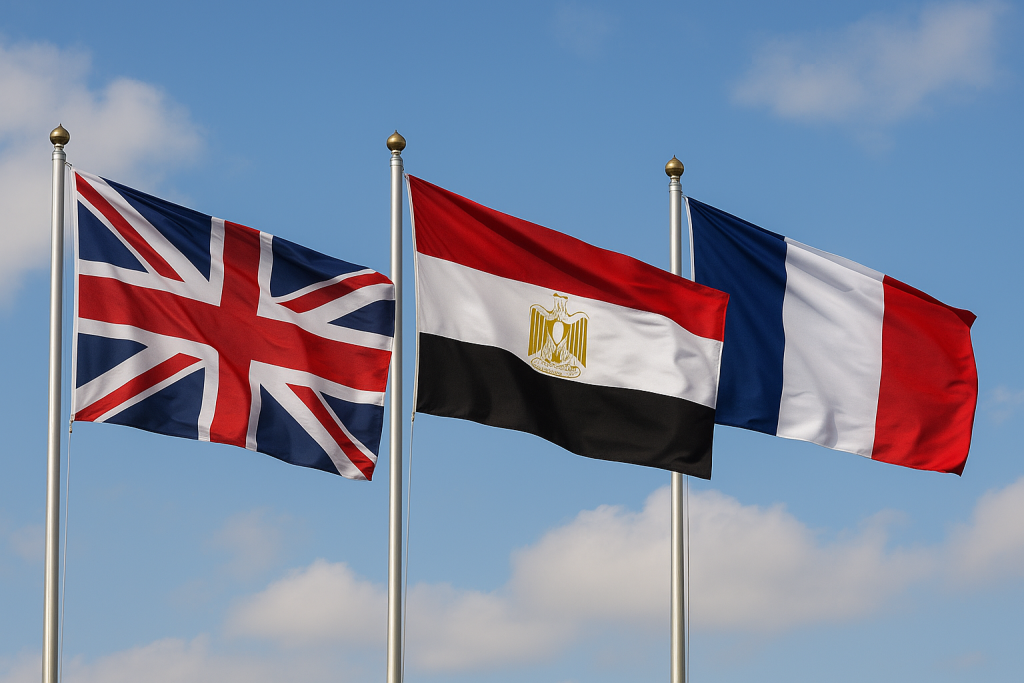Why the UK Must Lead Quietly as France’s Star Fades in the Middle East
 In the great diplomatic three dimensional chessboard of the Middle East, influence is not measured solely by embassies or summits – it’s measured by who picks up the phone and who picks up the bill; and in the case of Egypt, a vital player in any long-term effort to contain Iran and stabilise the region, the old alliances are shifting.
In the great diplomatic three dimensional chessboard of the Middle East, influence is not measured solely by embassies or summits – it’s measured by who picks up the phone and who picks up the bill; and in the case of Egypt, a vital player in any long-term effort to contain Iran and stabilise the region, the old alliances are shifting.
Historically, France has been viewed as one of Egypt’s most enduring Western intermediaries. Ties of language, education, energy cooperation, defence procurement, and diplomacy gave Paris a unique place in Cairo’s affections – especially when relations with Washington or London were cooler. But today, that influence is visibly eroding. And the UK would do well to take note.
The Macron Dilemma
President Macron, for all his ambition to act as Europe’s elder statesman, now finds himself in a weakened position – both at home and abroad.
Domestically, his authority is diminished. The pension reform crisis in 2023, persistent street unrest, and growing fragmentation within his centrist coalition have sapped his credibility. Internationally, Macron’s influence is increasingly seen as rhetorical rather than real. His efforts to lead European strategy on Ukraine, Africa, and now Gaza have often landed flat, not for lack of effort, but for lack of follow-through.
This will not have gone unnoticed in Cairo. Just as Merkel’s influence waned after she announced she wouldn’t run again, Macron’s perceived political expiry date has encouraged regional actors to hedge their bets. Egypt doesn’t deal in sentiment. It deals in leverage and right now, France has less of it.
Enter the UAE: Cairo’s New Anchor
Into this vacuum steps the United Arab Emirates. Quietly, strategically, and with deep pockets, Abu Dhabi has become Egypt’s most influential regional partner. The Ras El-Hekma deal – $35 billion in direct investment – was not only the largest foreign investment in Egyptian history, but a clear signal: Cairo now looks east as often as it looks west.
The UAE and Egypt are closely aligned on core issues: hostility to political Islam, suspicion of Western lecturing, support for regional stability through strong state institutions. They’ve collaborated in Libya, in Red Sea security, and on financial rescue packages. In short, where France once provided prestige, the UAE now provides power.
And Where Is America?
The United States, of course, remains a key player but one now viewed more as a necessary one rather than an inspirational international leader. Egypt still gets over $1.3 billion in annual US aid, and the Pentagon has deep ties with Cairo’s security establishment, but Washington’s influence is no longer clear cut.
Years of inconsistent policy – supporting the Muslim Brotherhood under Obama, stepping back under Trump, and offering conditional diplomacy under Biden—have made Egypt rather wary. Cairo respects the hardware and intelligence the US provides. But it no longer assumes that America’s leadership is steady or strategic.
The plain truth is that the United States is stepping back, quietly but still very deliberately, from its once-dominant role in the region, redirecting its focus toward Asia and its own domestic challenges. Egypt, ever the pragmatic nation, has read the signs. It’s widened its circle, drawing closer to China, keeping the lines open with Moscow, and leaning more heavily on its financial and strategic ties with the Gulf.
Britain’s Opportunity: Quiet Leadership
The UK should resist the temptation to try and replace France as Egypt’s high-profile patron. That would be a clear diplomatic misstep. Cairo does not respond well to overtures that feel either nostalgic or moralistic.
Instead, the UK should:
- Work with the UAE, behind the scenes, to align Egyptian interests with broader Western goals – particularly on Iran, Gaza, and Red Sea security.
- Engage France in a visible but measured way, to demonstrate European unity, without overestimating Paris’s present-day weight.
- Offer strategic depth through naval cooperation, intelligence support, and quiet diplomacy rooted in institutional memory. Britain’s long-standing presence in Egypt, through both defence and development, gives it a seriousness other players lack.
The Road Ahead
Egypt will be vital in any attempt to forge a lasting, regionally credible post-Iran settlement. It straddles geography, ideology, and diplomacy in a way few nations do. But to keep Cairo close, Western powers must understand where its ears now turn and who it sees as dependable.
France, under Macron, increasingly feels like a chapter that’s closing. The UK, if wise, will not try to take centre stage, but will instead act as a steady hand, a thoughtful partner, and a strategic coordinator.
In the Middle East, as always, subtlety is influence.
And in that, Britain still has something to offer.
Leave a Reply